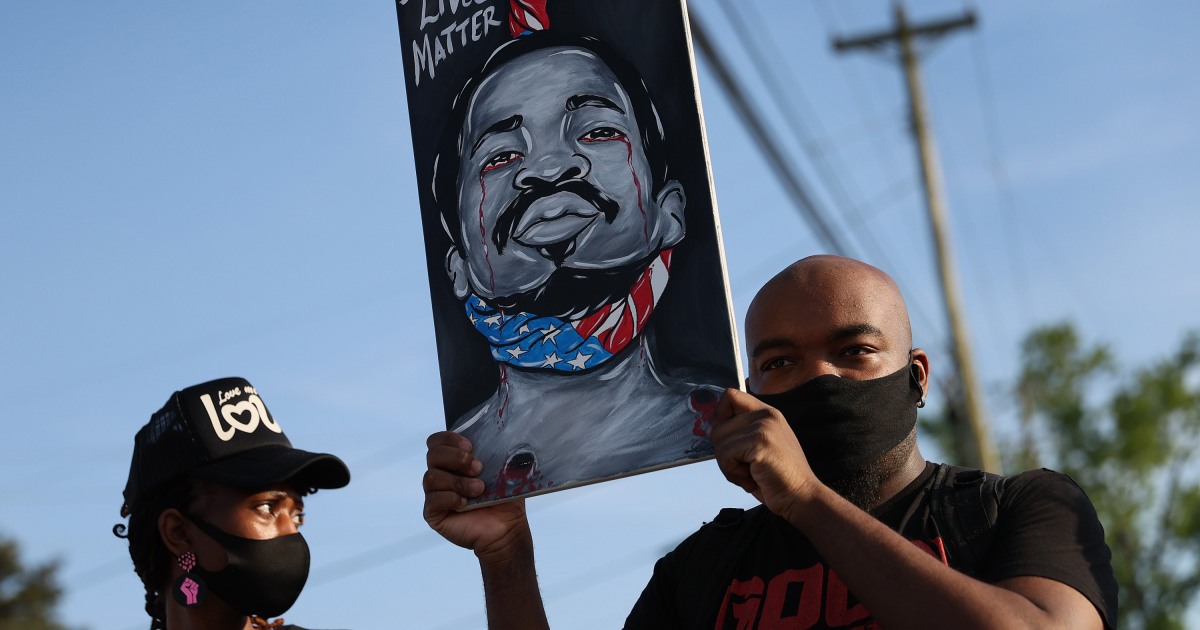
A North Carolina judge on Wednesday rejected a bid to have body-cam footage of sheriff’s deputies shooting Andrew Brown Jr. released to the public — but said the man’s family would be allowed to view it.
Superior Court Judge Jeff Foster said turning over footage to news media could affect a potential trial of law enforcement officers who opened fire while serving a warrant on the 42-year-old Black man in Elizabeth City, North Carolina.
But Foster ordered the sheriff to allow Brown’s immediate family and lawyer to privately view body-cam footage from four deputies within the next 10 days.
In many states, law enforcement footage, such as video shot from the dashboard of police cars or officers’ body cameras, is considered a public record, creating a defined, simple path for that to be publicly released.
But that’s not the case in North Carolina, which requires a judge’s order to allow such footage to see sunshine.
District Attorney Andrew Womble also said Brown’s car can be seen in footage moving backward and then forward, each time making contact with officers.
“As it backs up it does make contact with law enforcement officers,” Womble said. “At this point, the car is stationary. There is no movement and officers are positioned around the car. The next movement of the car is forward, it is in the direction of law enforcement and makes contact with law enforcement. It is then and only then that you hear shots.”
Attorney Michael J. Tadych, who is representing news media outlets, said there is an “absolute public interest” in releasing the recordings.
“The petitioners are not here to indict or vindicate law enforcement,” Tadych said. “They are here in the interest in advocating for transparency.”
Pasquotank County Attorney R. Michael Cox said the sheriff’s office supports release of videos.
He said that disclosure will “give the public some ability to understand what happened that day.”
“We want to protect the independent investigations by the SBI as well as the FBI,” Cox said. “However we do not believe the release of this footage will impeded those inquiries in any way.”
Bu DA Womble opposed the immediate release of footage, supporting just a private showing to Brown’s family.
Womble said widespread dissemination would hurt his chances of seeking a fair, possible trial against deputies.
The prosecutor promised to make a decision on possible charges in 30 days, when he’d either release all recordings or hold them back for trial.
And attorney H.P. Williams, representing law enforcement involved in the arrest, said his clients also oppose release of footage.
“The officers are very distraught over what happened,” William said. “They feel for the family of Andrew Brown.”
But Williams added: “We believe the shooting was justified.”
Law enforcement is still allowed to show, privately, such video to family members of those in police footage but that’s still within discretion of that agency.
The Brown family said Pasquotank County Sheriff’s deputies on Monday showed them just 20 seconds of last week’s deadly confrontation.
Brown was fatally shot when deputies sought to arrest him on felony drug charges.
The Pasquotank County Sheriff’s Office filed a petition with the court late Monday requesting permission to release recordings to Brown’s adult son, Ferebee.
Pasquotank County Sheriff Tommy Wooten pleaded for patience Monday, saying independent investigators need to examine all the evidence. He defended the short video that was shown to the family.
“This tragic incident was quick and over in less than 30 seconds, and body cameras are shaky and sometimes hard to decipher,” Wooten said. “They only tell part of the story. Outside investigators both from SBI [the North Carolina State Bureau of Investigation] and four other sheriff’s offices are interviewing witnesses and gathering more information.”
He was shot five times, four times in the right arm and then once in a fatal wound to the back of his head, according to an autopsy commissioned by the family.
Brown’s death is the latest police killing of a Black man that’s raised questions about police use of force, especially in cases involving racial minorities.
The death of George Floyd in Minneapolis a year ago touched off a summer of international protests against police brutality and institutional racism. Former Minneapolis police officer Derek Chauvin was convicted of Floyd’s murder last week.
John Jay College of Criminal Justice professor Gloria Browne-Marshall said body-camera footage is crucial technology in Brown’s case and many others, just to establish a baseline of facts.
“We, being the community at large including the legal community, are asking for body-camera video to know what took place at the scene, since usually it’s one person’s word against the other and the other person is dead,” said Browne-Marshall, who teaches constitutional law, policing in the minority community and rules of evidence.
This is a developing story, please refresh here for updates
Source: | This article originally belongs to Nbcnews.com









